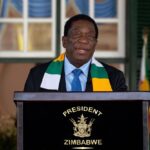The nation is in mourning following the death of former Vice President Phelekezela Mphoko at the age of 84. His passing, confirmed on Friday by Presidential spokesperson George Charamba, who simply stated, “Regrettably, I can confirm he is late,” to ZimLive, brings to a close the life of a prominent figure in Zimbabwean history.
Mphoko, who had been battling an undisclosed illness, passed away while receiving treatment in India, with his wife Laurinda at his side.
Born on June 11, 1940, Mphoko was a veteran of the liberation struggle, known by his nom de guerre, Report. He was one of the few surviving commanders from the Zimbabwe People’s Revolutionary Army (ZIPRA), playing a pivotal role in the fight for independence.
His contributions extended beyond the battlefield; his diplomatic career spanned several decades, serving as Zimbabwe’s ambassador to Mozambique, Austria, Botswana, Russia, and South Africa, beginning in 1987. Beyond his diplomatic roles, Mphoko was also a successful businessman, a former shareholder in Choppies Zimbabwe and a cattle rancher.
His political career reached its zenith when he served as Vice President under President Robert Mugabe from 2014 to 2017. This period saw him also take on the crucial portfolio of National Healing, Peace and Reconciliation, a testament to the trust placed in him by Mugabe.
Furthermore, on July 6, 2015, President Mugabe assigned Mphoko the responsibility for coordinating and implementing government policy, highlighting his influence within the ruling party. His political trajectory, however, took a sharp turn with the November 2017 coup that ousted Mugabe and installed Emmerson Mnangagwa as president.
Mphoko, a close ally of Mugabe, was subsequently removed from office. His later years involved navigating legal challenges, regularly appearing before the Harare Magistrate Courts.
Tributes have poured in from across the political spectrum, reflecting the profound impact Mphoko had on many lives. Professor Jonathan Moyo, former information and higher education minister, remembered him as “a selfless national liberation hero and gentleman; a PanAfrican not through slogans but in his household; a consummate diplomat, and an unassuming and reluctant politician whose deeds were defined by humility. The news of his untimely death is shocking.”
Saviour Kasukuwere, a former local government minister and political ally, described Mphoko as a “political giant,” adding, “A matured nationalist, VP Mphoko gave all his life in service of the country. He fought in the struggle for independence but never used a sickening sense of entitlement on others. He detested tribalism and soon it brought him into conflict with power-hungry and corrupt politicians.”
Tabeth Kanengoni-Malinga, former minister of state in Mphoko’s office, spoke of his inspiring leadership: “I had the distinct honor of serving as minister of state in his office, a role through which I came to know him not only as a visionary leader but also as a compassionate and principled man who dedicated much of his life to liberating Zimbabwe from colonial rule. I was profoundly moved by his tireless efforts to address the pressing needs of our people.
“He worked relentlessly to promote national peace, reconciliation, and equitable development. His wisdom and humility stood out, as did his deep and genuine concern for the well-being of every Zimbabwean, irrespective of their background or status.
“He inspired those around him to pursue the betterment of our nation with commitment and integrity. His pivotal contributions to Zimbabwe’s liberation struggle and his dedicated service in the years that followed will forever be etched in our history and our hearts.”
President Mnangagwa, in a condolence message, declared Mphoko a national hero, acknowledging his significant contributions to the country: “I learnt this afternoon with a deep sense of grief and sadness of the passing on of our former Vice President, Ambassador Report Phelekezela Mphoko, after a long illness.
“A veteran of our Liberation Struggle, Cde Mphoko’s political and military history coincides with the early days of militant nationalism against white settler colonialism which later morphed into the armed Liberation Struggle of which he was among its early architects, brave fighters and crop of formative and outstanding commanders. With his sad departure, our Nation has lost yet another stalwart of the Liberation Struggle whose contribution to our hard-won Independence can hardly be overstated,” he said.
The President continued, “In recognition of his meritorious role of service to his country, both before and after Independence, the Zanu PF Politburo has unanimously decided and agreed to celebrate and immortalize his life of sacrifice by according him the Status of National Hero”.
Mphoko’s presence at the 1979 Lancaster House Conference, a pivotal moment in securing Zimbabwe’s independence, further underscores his importance in the nation’s history. His life, marked by both remarkable achievements and challenging times, serves as a reminder of the complexities of Zimbabwe’s journey to independence and beyond.












